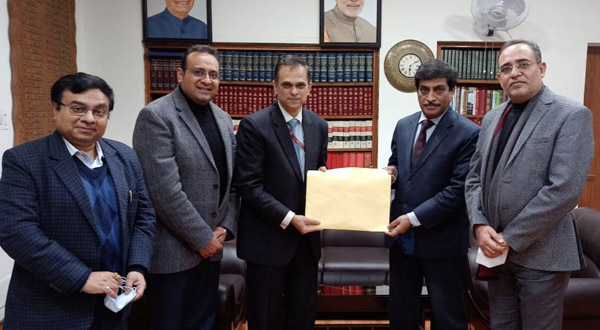
Jammu, Doda, Samba, Pulwama, Srinagar leading so far
J&K first UT/State to have DGGI: Dr Jitendra
Excelsior Correspondent
JAMMU, Jan 21: Union Home and Cooperation Minister Amit Shah will release the District Good Governance Index (DGGI) for 20 districts of Jammu and Kashmir tomorrow afternoon virtually from New Delhi in a function organized jointly by Department of Administrative Reforms & Public Grievances (DARPG), Government of India and Jammu & Kashmir Institute of Management, Public Administration & Rural Development in association with the Centre for Good Governance, Hyderabad.
Dr Jitendra Singh, Union Minister for Personnel, Public Grievances and Pensions and Manoj Sinha, Lieutenant Governor of Jammu & Kashmir will also address the event from Jammu.
Highly placed sources told the Excelsior that the districts of Jammu, Doda, Samba, Pulwama and Srinagar are likely to figure among top five districts initially but they will keep rotating as the Central and UT agencies will monitor their performance regularly even on daily and weekly basis like the aspiration districts.
Commenting on the initiative, Union Minister for Personnel, Public Grievances and Pensions besides MoS in the Prime Minister’s Office (PMO) Dr Jitendra Singh, said: “the Department of Administrative Reforms in the Personnel Ministry has given high priority to the Union Territory of Jammu and Kashmir which will have first District Level Good Governance Index to assess performance of all 20 districts of the UT in different parameters and give them ranks accordingly”.
Dr Jitendra Singh said the rankings will keep changing regularly as the Department will continue to monitor performance of all 20 districts on daily, weekly and monthly basis.
“This will enable Jammu and Kashmir to raise performance standard and become more competitive which will help them adopt best practices which are prevalent in other States and Union Territories,” Dr Jitendra Singh said, adding that all this is becoming possible today due to abrogation of special status of Jammu and Kashmir.
Meanwhile, an order issued by Manoj Kumar Dwivedi, Principal Secretary, General Administration Department (GAD) today said that all Administrative Secretaries stationed at Jammu will attend the conference tomorrow on launch of the DGGI.
“The Administrative Secretaries stationed at Srinagar, the Divisional Commissioner Kashmir and Kashmir based Heads of Departments (HoDs) will attend the conference through video conference mode while the Divisional Commissioner Jammu, the Deputy Commissioners of Jammu, Samba, Kathua, Reasi and Udhampur and all other DCs along with Chief Planning Officers/DSEOs will join through video conference,” the GAD order read.
An official statement issued in New Delhi said the DGGI of Jammu and Kashmir was prepared by DARPG in collaboration with Government of Jammu and Kashmir in pursuance of the announcements made in the “Behtar e-Hukumat – Kashmir Aelamia” resolution adopted on July 2, 2021 in the regional conference on Replication of Good Governance Practices held at Srinagar.
The exercise on formulation of District Good Governance Index was set in motion in July, 2021 which has now been completed and Jammu & Kashmir will become the first Union Territory in the country to have Good Governance Index.
“The District Good Governance Index of Government of Jammu and Kashmir represents a major administrative reform in benchmarking good governance at district level and a significant step for timely collation and publication of statistics at State/ District level. The DGGI is a milestone and it is expected that it will provide a robust framework for evidence based assessment of the performance of all the districts in Jammu & Kashmir,” the statement said.
Chief Secretary of Jammu & Kashmir Arun Kumar Mehta and V. Srinivas, Secretary DARPG, Government of India will also be addressing the event, which will be attended by senior officials of Government of Jammu and Kashmir, District Collectors and Chief Planning Officers of the districts. Secretaries of Planning and Secretaries of Administrative Reforms of all State/ UT Governments and District Collectors of non-election bound States have also been invited to participate in the event through video conferencing.
“During the occasion, a presentation on formulation of District Good Governance Index will be made by Centre for Good Governance, Hyderabad. This will be followed by district presentations by selected 12 District Development Commissioners, who will be showcasing achievements of various sectors. Thereafter a panel discussion will be held on DGGI- A Way Forward for futuristic 2.0 version of DGGI for measuring and benchmarking performance and improvement of districts in future as well,” the statement said.
Meanwhile, Union Secretary, Department of Administrative Reforms and Public Grievances (DARPG), V Srinivas today presented the first copy of District Good Governance Index (DGGI) to Chief Secretary, Dr Arun Kumar Mehta here in presence of Principal Secretary Information and Higher Education, Rohit Kansal, Principal Secretary, GAD, Manoj Kumar Dwivedi and DG IMPARD, Sourabh Bhagat.
The maiden exercise is the sequel to the many administrative reforms taken in hand by J&K administration post August, 2019. The exercise is first of its kind in the country where districts have been rated as per their score computed on public feedback and reforms taken in making the governance process simple, swift, innovative, accessible and accountable.
On the occasion, the Chief Secretary termed it as a milestone in improving the overall culture of offering people-friendly administration with an inherent sense of accountability along with transparency in its functioning.
He said the exercise is prelude to the umbrella process taken by the government to make governance more responsive, reformative, reasonable, rational and accessible at doorsteps of people.
Dr Mehta lauded both DARPG and IMPARD for culminating this tedious exercise in such a short duration of time. He maintained that this exercise would be made more evolved and inclusive in future overspreading to even the lowest levels of administration.

